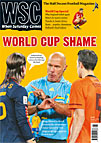 James Eastham assesses public recrimination and media reaction following a campaign that left even the pessimists disappointed
James Eastham assesses public recrimination and media reaction following a campaign that left even the pessimists disappointed
As France manager Raymond Domenech and his players sloped home from their disastrous World Cup campaign to face the biggest communal ear-bashing since somebody suggested abolishing the 35-hour week, the media lined up to take pot shots at a squad whose downfall was anything but a shock.
Critical cover stories have become the norm over the past six months as sordid tales of players’ private lives have been splashed across the news weeklies as well as the sports sections. But the post-World Cup analyses were remarkably free of “I told you so” jibes because even the most pessimistic commentators were taken aback by the depths to which Les Bleus plunged during their catastrophic South African journey.
Among the various embarrassments of France’s World Cup, the episode that caused greatest outrage was “the bus of shame”, the phrase the media use for the day the players holed themselves up in their team bus and refused to train. The players promised to give their version of events on returning home, yet by opening their mouths they achieved the near-impossible feat of lowering their reputations. During an insipid TV interview, captain and ringleader Patrice Evra insisted the decision to strike had been unanimous, something goalkeeper Stéphane Ruffier flatly denied a week later. An unimpressed France Football magazine said Evra had been “a disastrous captain. His pride meant he didn’t want to lose face, but he ended up losing his head instead.”
But the media saved its stiffest criticism for Thierry Henry, once France’s most popular player. Several reporters suspected that he had sulked his way through the finals after losing his first-team place and the captain’s armband, and a post-tournament interview did nothing to dispel those views. “I could have been the big brother in the squad, but I wasn’t anymore. I felt pushed aside. I used to be at the centre of things. People didn’t seek advice from me the way they did in the past.” Calling him “His Majesty Henry” France Football suggested that the nation’s top international scorer had deliberately handed others enough rope to hang themselves for his own benefit. “By keeping quiet, Henry knew we’d see his mate Evra wasn’t up to the captaincy, which would then prove he was the only potential leader in the squad. Even in decline, Henry still wanted to be king.”
Certain members of the France squad hold the media in such contempt – William Gallas responded to one question after France’s 2-0 defeat to Mexico by sticking up his middle finger – the press pack’s condemnation risked falling on deaf ears. So it was a relief when the class of 98 spoke out, as their comments gave the general uproar a seal of approval. The World Cup winners’ media omnipresence may not be to everyone’s liking, but they stand the best chance of making the current squad sit up and listen. Bixente Lizarazu showed there was no love lost between left-backs as he complained that Evra’s interview “revealed nothing about the problems in the France camp. He said he was speaking to the ‘French people’, as if he were president of the republic. I think being captain has made him blow a fuse.” Lilian Thuram went even further, telling a French FA committee that Evra should never play for France again. He also had a dig at Henry: “If he’d put his boots on and got off that bus, plenty of others would have done the same. Why didn’t he? I don’t understand. And, unlike some of the others, he’s very intelligent.”
Domenech had matters of state to attend to when he was called to explain his team’s disastrous campaign in front of MPs. Yet this blatant attempt to exploit the public mood backfired on the politicians, who emerged none the wiser. “He didn’t answer our questions,” said one. Now they know how the rest of us have felt for the past six years. The next six years will be different, if new France manager Laurent Blanc stays in charge that long. One of his first decisions was to ban players from wearing headphones in public, which means an end to those silent, gum-chewing walks from bus to dressing room. A minor move, perhaps, but one that signals the start of a long, rehabilitative process for a team that has hit an historic low.
From WSC 282 August 2010